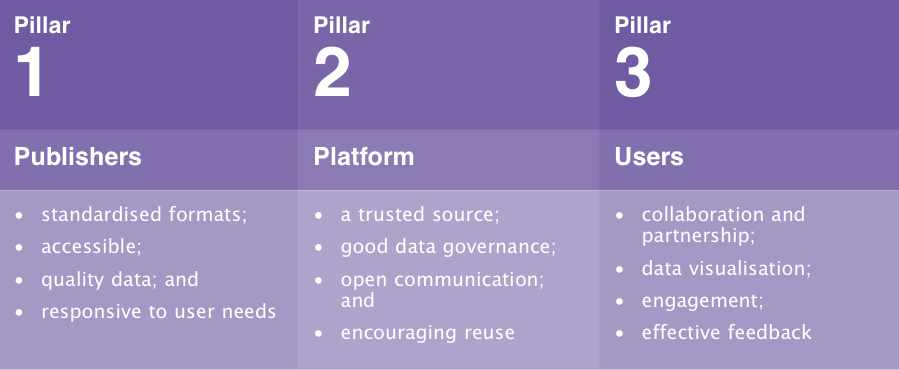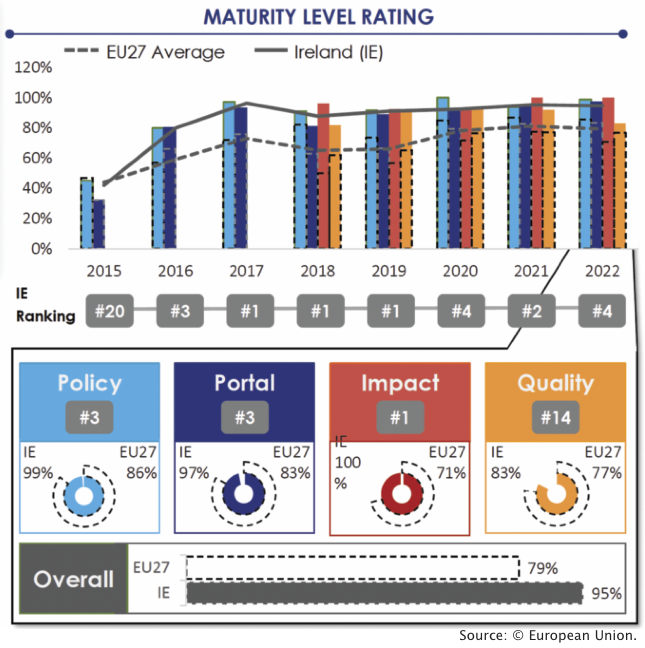Open data: A five-year vision

Efforts to return Ireland to its previously held ranking of first for open data maturity across Europe’s member states have been underpinned by a new five-year strategy.
Ireland has made massive strides in open data maturity, emphasised by its rise in EU rankings from 18th in 2017 to first from the three years from 2018 to 2020.
However, in recent years, a focus by other countries including France and Denmark on their own open data policies and practices has seen them leapfrog Ireland to the top title.
Published by the Department of Public Expenditure, NDP Delivery and Reform (DPENDPDR) in November 2023, the Open Data Strategy for 2023-2027 provides a framework for the actions the public service will take on open data over the next five years.
The strategy aims to create easy access to high-quality government data to promote trust and innovation across the public sector.
Ireland’s first open data strategy was published in 2017, following the establishment of an Open Data Unit in the Department of Public Expenditure in 2015. The value of open data was highlighted following the outbreak of the pandemic, when governments, businesses, organisations, and public services were able to share vital information quickly, efficiently, and ethically.
To date, Ireland’s open data portal, where data is published under an open licence to be freely used, re-used, and redistributed, links to over 15,000 datasets from some 160 publishers.
The five-year strategy comprises a range of guiding goals for data publishers; data users; and the development of the Open Data platform.
The aim of the open data publishers pillar is to drive the production of high-value and high-quality datasets responsive to users’ needs. Some of the key elements of the delivery of the goal include the facilitation of increased publication of relevant data not currently available to align with stakeholders’ data needs.
In addition to seeking the education of a “critical mass” of public servants on effective data management strategies, the Department says that it wants to ensure the publication of high-quality and high-value datasets by building a community of practice through stakeholder engagement, training, and support.
Ultimately, the aim is to create greater clarity among publishers and potential publishers on what data they should make available as open data.
In relation to the open data platform pillar, aiming to drive a thriving open data ecosystem supported by a trusted open data platform responsive to stakeholders’ needs, the Department says that it will update the platform to deliver better searches, graphics, and “an improved personalisation of experience through effective stakeholder collaboration and feedback loops”.
Additionally, the Department says it will strengthen governance frameworks to meet privacy, security, and ethics standards, building trust in the system.
Finally, for users the aim is to shape and improve easy access to and use of trusted open data sources, with the Department saying it will build data visualisation capability within the portal to make open data more user friendly; create effective feedback loops with user groups and communities of interest; and facilitate collaborative partnerships “to strengthen users’ involvement to co-create and increase open data use across sectors and in our communities”.
Underpinning the publication of our open data is a technical framework that provides requirements for public bodies to ensure that published datasets meet clearly defined standards and are published in a consistent way that makes them more discoverable, accessible, and reusable.
Encouraging all public bodies to ensure implementation of the strategy as he commented on its launch, Paschal Donohoe TD, Minister for Public Expenditure says: “It is essential that they collaborate to deliver the vision for Ireland as a country where the economic, social, and democratic opportunities and benefits of open data are recognised and achieved by all stakeholders.
“I believe that the implementation of this strategy by all partners, under the leadership of the Open Data Governance Board, will deliver significant opportunities for Ireland over the next five years and beyond. I look forward to seeing the benefits of this for the people of Ireland.”







